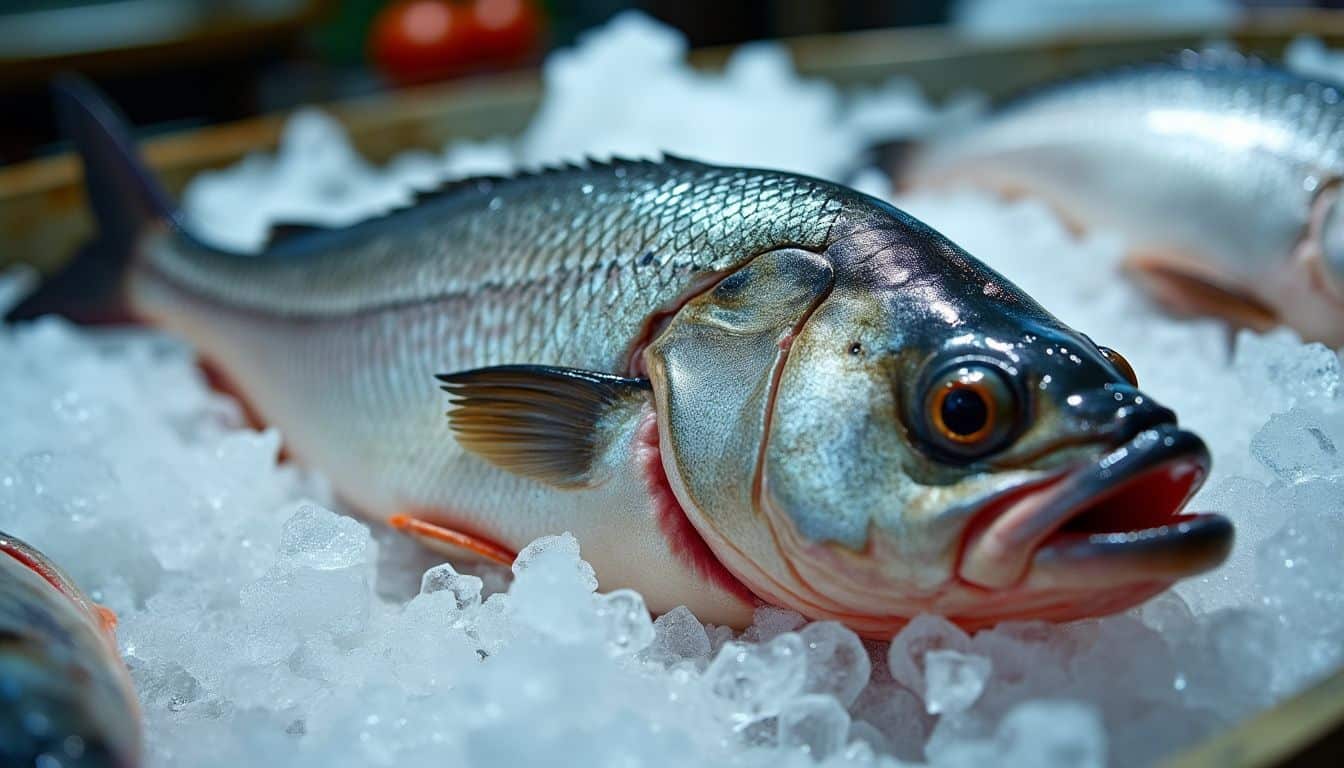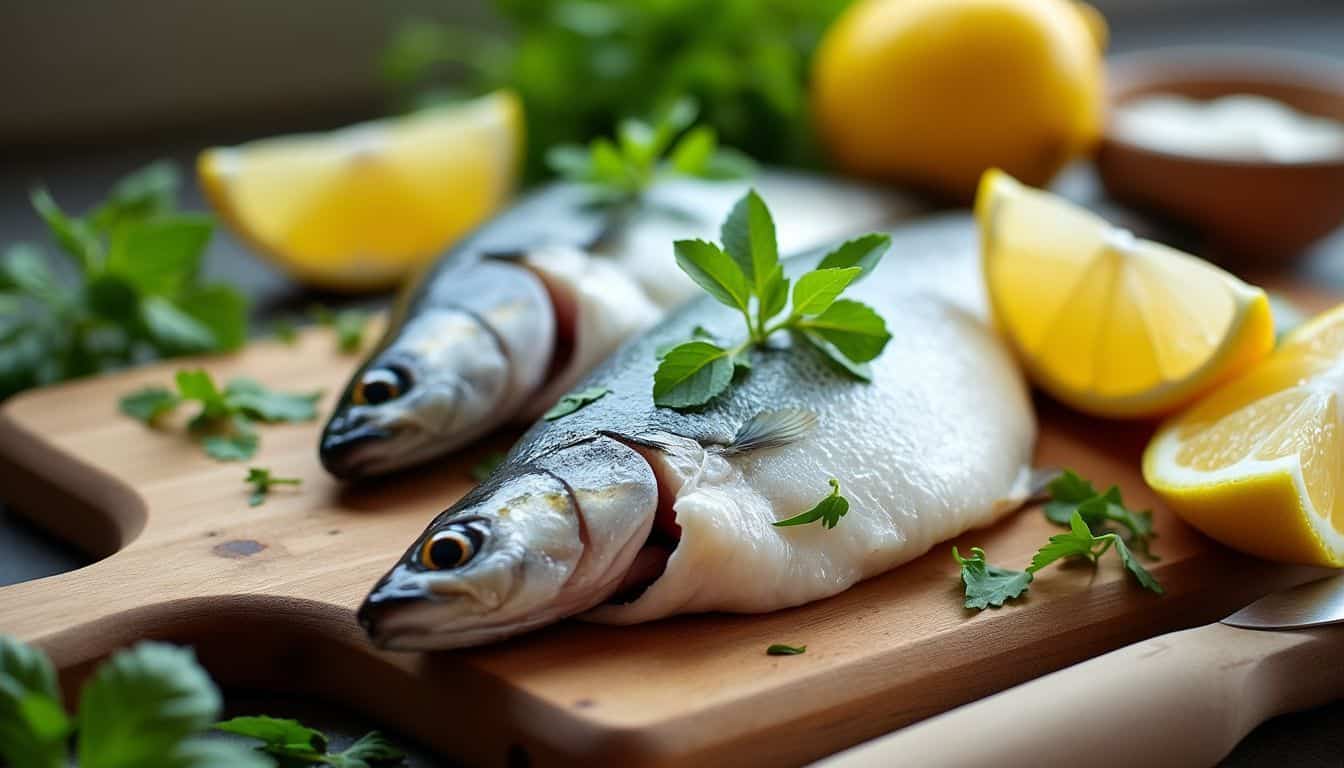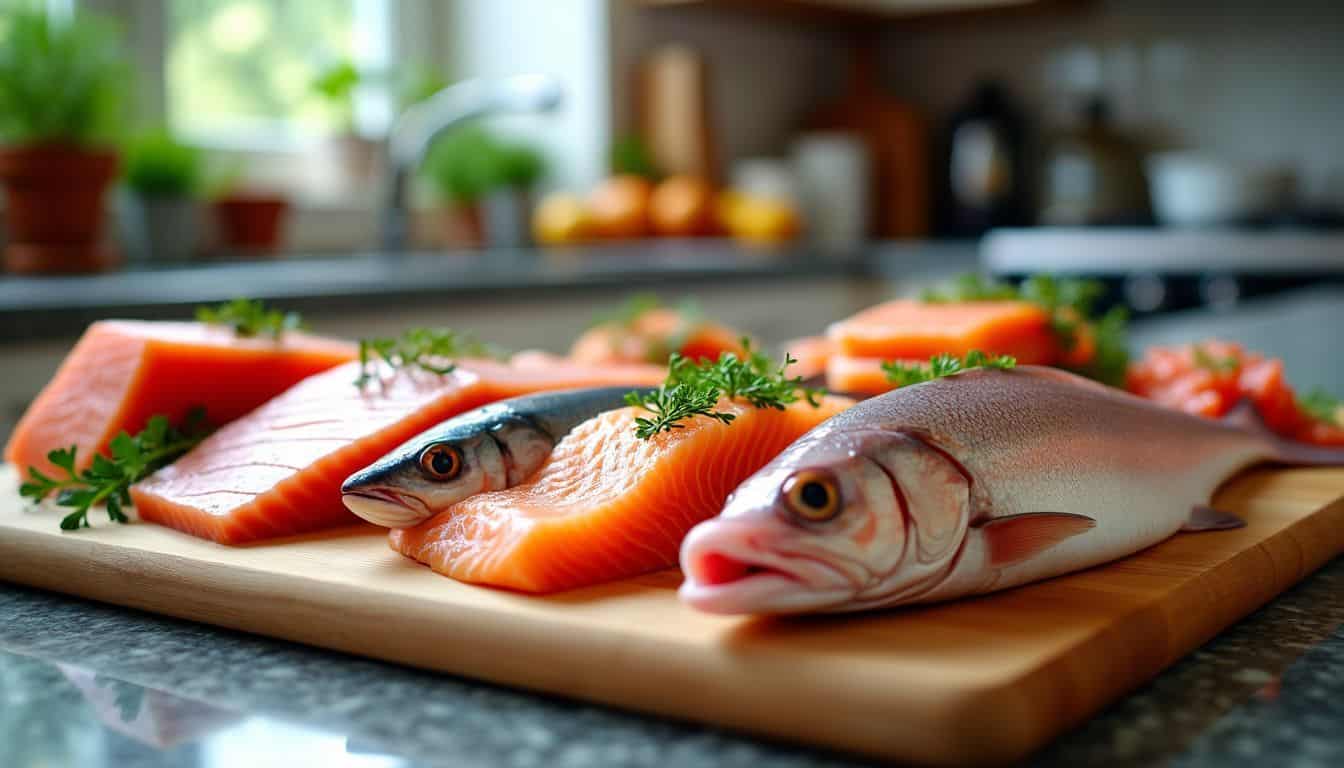Is cod fish good for you? Many people ask this question when trying to make healthier food choices. Cod is a popular fish that’s full of nutrients and low in calories. 2 This article will show you five great health benefits of cod fish that might surprise you.
Ready to learn about cod? 1
Key Takeaways
Cod is a nutritional powerhouse, with 20 grams of protein per 4-ounce serving and only 90 calories.
It’s rich in omega-3 fatty acids, which can lower heart disease risk by up to 30% and reduce inflammation.
Eating 150 grams of cod five times a week helped people lose 3.7 pounds more than those who didn’t in one study.
Cod provides about 20% of daily phosphorus needs and 40% of selenium needs, supporting bone and teeth health.
While generally low in mercury, pregnant women should limit cod intake to 8–12 ounces weekly as part of a varied diet.
Table of Contents
Nutritional Profile of Cod

Cod’s a nutritional powerhouse. It’s packed with good stuff that’ll make your body sing – think protein, omega-3s, and vitamins galore!
High Protein Benefits of Cod

Cod packs a protein punch! This lean fish is a powerhouse, offering 20 grams of protein in just a 4-ounce serving. 1 That’s a big deal for your muscles, ladies. Protein helps build and repair tissue, keeping you strong and toned.
It’s also a dieter’s best friend – it’ll keep you feeling full longer, helping you dodge those pesky snack cravings.
But wait, there’s more! Cod’s protein goodness doesn’t come with a side of guilt. It’s low in calories (only 90 per serving) and fat, making it a perfect fit for various diets. Whether you’re going low-carb, Paleo, or just trying to eat healthier, cod fish for sale is a smart choice.
Plus, it supports your immune system and may even lower your risk of heart disease. 2 Talk about a fin-tastic deal!
Cod is the unsung hero of the protein world – all the benefits, none of the bulk!
Omega-3 Fatty Acids in Cod

Moving from cod’s protein perks, let’s dive into its omega-3 goodness. Cod swims with heart-healthy fats. These omega-3s are like tiny superheroes for your body. They fight off bad guys like inflammation and high cholesterol.
A 3-ounce serving of cooked cod gives you a nice dose – 0.05 grams of DHA and 0.018 grams of EPA. 3
But wait, there’s more! Cod liver oil is a treasure trove of vitamins A, D, and E. It’s like a multi-vitamin in a bottle. These nutrients team up with omega-3s to boost your immune system and keep your bones strong.
Plus, they help your body absorb other nutrients better. It’s like they’re the friendly doormen of your digestive system, welcoming in all the good stuff. 2
Cod: Low in Calories and Saturated Fat

Cod is a dieter’s dream fish. It’s super low in calories – just 71.4 per 3-ounce serving. That’s less than a small apple! 4 And get this: it has only 0.2 grams of fat in that same portion.
Talk about a lean protein powerhouse! I’ve found cod to be a lifesaver when trying to shed a few pounds without feeling hungry all the time.
Ladies, if you’re watching your waistline, cod’s got your back. A 100-gram serving packs a mere 0.67 grams of fat. That’s practically nothing! 1 You can enjoy a hearty, filling meal without the guilt.
Plus, with 17.3 grams of protein per 3-ounce serving, it’ll keep you full and satisfied. 4 Now, let’s dive into how cod supports your ticker….
Health Benefits of Cod

Cod isn’t just tasty – it’s a health powerhouse! Let’s dive into some fin-tastic benefits that’ll make you want to reel in more of this swimmer for your plate.
Cod Supports Heart Health

Cod packs a punch for your ticker. This fish is loaded with omega-3 fatty acids, which are heart heroes. They lower blood pressure and cut heart disease risk by up to 30%. That’s a big deal for women looking to keep their hearts healthy. 5
But wait, there’s more! Cod helps your body in other ways too. It lowers triglycerides, which are fats in your blood. This leads to a healthier metabolic profile. Plus, the omega-3s in cod fight inflammation.
It’s like giving your heart a big, fishy hug. 5
Cod is not just a fish, it’s a heart’s best friend.
Cod Aids in Weight Management

Cod packs a punch for weight loss! This lean fish is a dieter’s dream. With only 71 calories per 3-ounce serving, it fills you up without filling you out. 6 But that’s not all – cod’s high-protein content (17.3 grams per serving) helps build and repair muscles.
This means you’ll burn more calories, even when you’re not moving.
Here’s a fun fact: eating cod can supercharge your weight loss efforts. A study found that people who ate 150 grams of cod five times a week lost 3.7 pounds more than those who didn’t. 6 That’s like shedding an extra bag of sugar! Plus, pescatarian diets (that’s fish-eaters to you and me) are linked to lower BMIs. So, if you’re looking to slim down, cod might just be your new best friend.
It’s a fin-tastic way to manage your weight without feeling like you’re on a diet.
Cod Improves Brain Health

Cod is a brain-boosting powerhouse! Its omega-3 fatty acids work wonders for your noggin. These healthy fats help keep your mind sharp and your memory on point. I’ve noticed a big difference in my focus since adding cod to my diet.
It’s like giving your brain a little spa day with each bite. 7
But wait, there’s more! Cod’s vitamin B12 is a real game-changer for brain health. It helps make red blood cells and keeps your DNA in tip-top shape. That’s crucial for keeping your mind firing on all cylinders.
In addition to Lion’s Mane mushroom, cod is a smart choice for a brain-healthy diet. Now, let’s dive into how cod can help you manage your weight….
Cod Strengthens Bones and Teeth

Cod packs a punch for your skeleton! This fin-tastic fish is loaded with phosphorus and calcium, key players in keeping your bones and chompers strong. Phosphorus in cod gives you about 20% of what you need daily.
That’s a big deal for your body’s framework. Plus, if you munch on the soft, edible bones in canned cod, you’re getting an extra calcium boost. 2
But wait, there’s more! Cod is also good for your prostate and overall health. It’s packed with selenium – about 40% of your daily needs in just one serving.
This mineral teams up with calcium to keep your bones tough as nails. So, next time you’re at the fish counter, grab some cod. Your bones (and teeth) will thank you! 8
Cod is like nature’s calcium supplement… but tastier! – Unknown
Potential Risks of Consuming Cod

While cod is a healthy fish, it’s not all smooth sailing. Let’s dive into some risks you should know about before you make cod a regular on your plate.
Mercury Exposure from Cod

Cod is generally safe to eat, but it’s good to know about mercury. This metal can build up in fish over time. The good news? Cod has less mercury than many other fish. 2 Still, too much mercury isn’t great for you.
It can affect your brain and behavior. 9
Pregnant women should be extra careful. The FDA says it’s fine to eat 8–12 ounces of low-mercury fish each week if you’re expecting – that’s about two or three servings. Cod fits the bill here.
It’s a great option for moms-to-be who want to enjoy fish without concern. Just keep in mind to mix it up with other healthy foods too!
Cod and Allergic Reactions
Cod allergies can be a real challenge for some people. If you’re allergic to cod, your body might react when you eat it. You could get itchy, break out in hives, or even have trouble breathing. 10 It’s serious – cod is one of the top eight food culprits for allergies.
But don’t worry, ladies. If you enjoy fish but can’t eat cod, there are many other options. Salmon, tuna, or even tilapia might be great alternatives. Just be sure to talk to your doctor before trying new seafood if you’ve had problems before.
Now, let’s compare how cod measures up to other popular fish….
High Sodium Content in Processed Cod
Processed cod can pack a salty punch. Regular cod has about 60 milligrams of sodium per 3-ounce serving. But treated cod? It’s a whole different ball game. The sodium levels skyrocket, making it a less heart-friendly choice. 11 This matters for women watching their blood pressure or at risk for heart issues.
Canned or smoked cod often swims in a sea of salt. Food makers add it to boost flavor and shelf life. But too much sodium can lead to water retention and bloating – not fun! It’s smart to check labels and pick lower-sodium options when possible.
Your taste buds might need time to adjust, but your body will thank you.
Cod vs. Other Popular Fish

Let’s dive into the fishy face-off! Cod’s not the only fish in the sea, so how does it stack up against its scaly cousins?
Cod Compared to Salmon
Cod and salmon offer different nutritional benefits. Salmon provides more protein, with 22 grams per 3-ounce serving. 12 Cod offers 19 grams. Cod stands out for its low-fat content – just 1 gram per serving, making it great for weight management.
Salmon contains 10–13 grams of fat, mostly healthy types.
I’ve prepared both fish, and they’re quite distinct. Salmon’s rich, oily texture is great for grilling. Cod? It’s perfect for a light, flaky fish fry. For omega-3 fats, salmon outperforms cod.
A 3-ounce serving of salmon provides 1.8 grams of these heart-healthy fats. Cod? Only 0.1 grams. But if you’re watching your calories, cod’s your best bet. Its low-fat profile makes it ideal for weight loss.
So, ladies, whether you prefer salmon or cod, both can be part of a nutritious diet.
Cod’s Benefits over Other Fish Varieties
While salmon packs a punch, cod has its own set of perks. This white fish swims ahead in some areas. It’s lower in calories and fat than many other fish. That’s great news for anyone watching their waistline! 8 Plus, cod is easier on the wallet.
You can enjoy its health benefits without breaking the bank.
Cod also stands out for its mild flavor. It’s a hit with picky eaters who shy away from “fishy” tastes. The light taste makes cod a blank canvas for cooking. You can jazz it up with spices or keep it simple.
Either way, you’re getting a boatload of protein and nutrients. 3 Cod’s versatility in the kitchen is hard to beat. It’s a go-to for quick, healthy meals that even fish newbies will love.
People Also Ask
Is cod fish a good source of nutrients?
You bet! Cod is swimming with good stuff. It’s packed with vitamin D, B6, and potassium. These little swimmers are like nature’s multivitamin. Whether you’re reeling in Atlantic or Pacific cod, you’re getting a boatload of essential nutrients.
Can eating cod help with heart health?
Absolutely! Cod is a heart’s best friend. It’s loaded with omega-3 fatty acids, EPA and DHA. These good fats are like tiny lifeguards for your ticker. They help keep your blood pressure in check and fight off those pesky cardiovascular diseases.
Is cod safe for people with diabetes?
Cod’s a catch for diabetics! It’s low in carbs and high in protein. This fishy feast can help improve insulin sensitivity. It’s like a secret weapon against type 2 diabetes. Just remember, how you cook it matters. Stick to broiling or baking for the best results.
How does cod compare to other fish?
Cod’s a star in the sea of choices. It’s leaner than oily fish like salmon, but still packs a nutritional punch. It’s lower in mercury than some big fish, making it a safer bet. Plus, it’s versatile. Throw it in curry or pair it with whole grains and veggies for a fin-tastic meal!
Can cod help with weight management?
You’re on the right track with cod! It’s low in calories but high in protein. This combo can help you feel full without weighing you down. It’s like a secret weapon for folks looking to shed a few pounds. Just don’t deep fry it – that’s like putting floaties on a fish!
Are there any risks to eating cod?
Like anything, moderation is key. Some folks might have a fish allergy, so watch out for that. Also, while cod’s generally low in mercury, it’s good to mix up your fish choices. And if you’re taking fish oil supplements, chat with your doc to avoid going overboard on omega-3s.
References
^ https://www.verywellfit.com/cod-nutrition-facts-and-health-benefits-5075574 (2024-06-30)
^ https://www.medicalnewstoday.com/articles/324741 (2019-03-19)
^ https://www.healthline.com/nutrition/is-cod-healthy (2019-01-23)
^ https://aksalmonco.com/blogs/learn/is-cod-healthy?srsltid=AfmBOor0lvanltEsSX519ktWpq8Q1W3N06sNE3GtJCss1RUsckFUT3vL
^ https://aksalmonco.com/blogs/learn/is-cod-healthy?srsltid=AfmBOopCKKvp8tqbvHmq51uteu9uyyIIl2pNmPw4vGx-wuhNx-RbSIRX
^ https://aksalmonco.com/blogs/learn/is-cod-healthy?srsltid=AfmBOopEpwKCUeIsO51aDjWtLePW3ACmZUrGCXYWpX_gOyuqepYMdhNo
^ https://www.healthifyme.com/blog/cod/
^ https://www.webmd.com/diet/health-benefits-cod
^ https://www.healthline.com/nutrition/mercury-content-of-fish (2018-09-14)
^ https://aksalmonco.com/blogs/learn/is-cod-healthy?srsltid=AfmBOopt3LTV-po3SIiydBVM3IOn0PSLhxrYyKpzMLeiwquTlo7eMDF_
^ https://safebeat.org/cardiac/heart_health/is_cod_healthy_the_health_benefits_and_side_effects/
^ https://www.drberg.com/blog/salmon-vs-cod-which-is-healthier?srsltid=AfmBOooZX96OdL1wvGdTa9QAtrl_XHJJBqYa8o5Edgo7S1Y7cr8GBCLv (2024-08-27)
